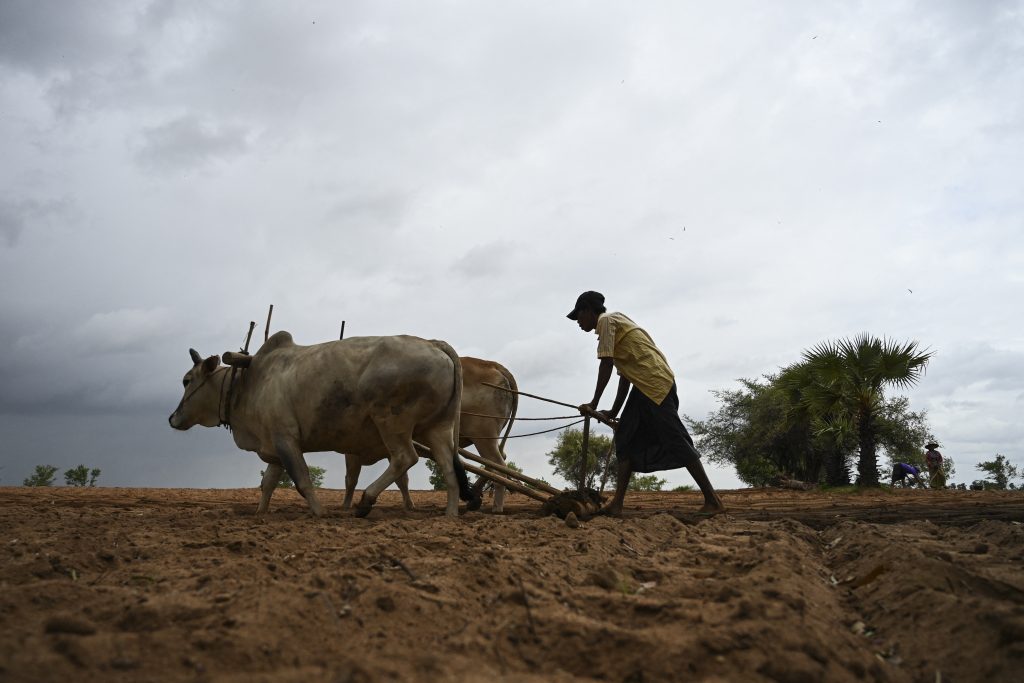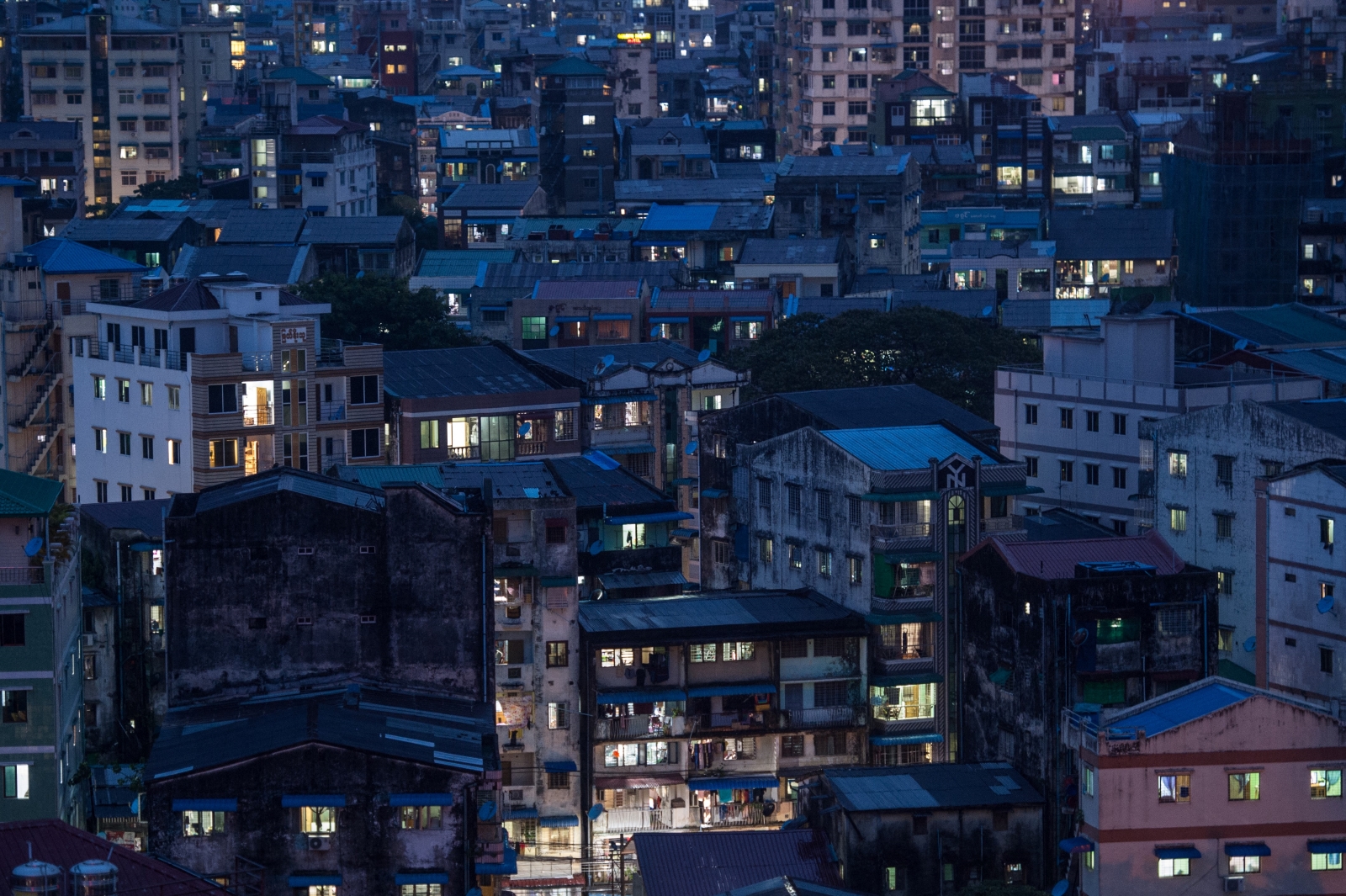With jobs in rural areas scarce, thousands of workers who have returned to their villages to escape violent crackdowns in Yangon are unable to support their families and are relying on relatives.
By FRONTIER
When Ko Lin Lin returned after an 11-year absence to the green, quiet village he had once called home, he was too anxious to appreciate the peace and beauty that he had so often missed while working in Yangon.
His mind was troubled by the possibility that he might not find a job and be able to support his family.
His home village, Sagargyi in Ayeyarwady Region’s Danubyu Township, is a typical delta community of about 2,000 households that mainly rely on agriculture for their income.
“I left the village for Yangon 11 years ago because there was no job for me here. Most village residents grow paddy or beans, but for those of us who do not own land, Yangon was the only option,” said Lin Lin, a father of three.
Lin Lin had settled in Yangon’s heavily industrial Hlaing Tharyar Township, but when it was wracked by political unrest after the coup, he decided it would be safer to return to Sagargyi, where his parents and siblings live.
On March 14, security forces killed more than 50 people in Hlaing Tharyar in one of the most brutal crackdowns anywhere in Myanmar since the coup. Dozens of factories in the industrial zone were also burned, with the military regime and residents blaming each other for the arson attacks. That evening, the regime placed the township under martial law.
Read more: A day of tragedy and terror in Hlaing Tharyar
“I was worried about my children; two of them are teenagers who are enthusiastic for the protests. I was afraid that they might be arrested when police raid the streets around us; if I stayed in Yangon, it would be too dangerous for them,” he said.
Lin Lin had run a small restaurant in one of the industrial zones at Hlaing Tharyar that earned only a small profit, but his family made ends meet by selling liquor illegally to customers at karaoke venues near their home.
The closure of KTVs last year because of COVID-19 left Lin Lin in a difficult financial position, but he never considered leaving Yangon.
“I resisted leaving Yangon for as long as I could. I tried to stay even when my profit did not cover our basic living costs. But when the coup threatened our lives, returning home was the only option,” he said.
Just four days after the March 14 crackdown, he and his family arrived back in Sagargyi, on the Ayeyarwady River. He soon began to feel anxious, though, realising that despite his 11-year absence, something had not changed. There was still no job for him.
“It is okay to rely on parents for a few days, but it is not good for the long term because I have a big family,” Lin Lin said.
“My parents are about 65 years old. They have to rely on the support of my younger siblings. If I stay here without a job, I will feel ashamed because I am the eldest son of the family,” he said.
Lin Lin’s story is echoed across Ayeyarwady Region, which has been a significant source of workers for Yangon’s factories and construction sites since Cyclone Nargis tore through the area in May 2008, destroying homes and leaving almost 140,000 dead and missing.
But the brutal crackdowns in Yangon have prompted thousands of people living in Hlaing Tharyar, as well as Shwepyithar and South Dagon, which are also now under martial law, to return to delta home towns and villages like Sagargyi.
Read more: Residents flee violence, martial law in Yangon factory district
Daw San, who has a shop in the Sagargyi village market, said she had noticed many returnees from Yangon, as well as strangers, since early March.
“In the mornings, the market is unusually crowded. Normally it’s open until 11am but these days meat such as fish and pork are sold out by 9am,” she said.
Although the returnees feel safe staying in the village, they are uncertain about their ability to earn income to support themselves and their families. Competition for the few available jobs in the region is now fiercer than ever, and most of the returnees Frontier interviewed had been unable to find work.
Lin Lin wants to open a small shop selling rice and curries but he knows it is not a good choice.
“There are already two shops like that. Besides, as you know, villagers like to cook for themselves. They don’t want to waste money buying food outside,” he said.
Lin Lin’s wife, Daw Sandar, is trying to make money by cooking mohinga, a traditional breakfast dish of vermicelli and fish broth, for families when they hold donation ceremonies called aloo eain.
Families in Danubyu’s Htone Bone village are facing similar challenges. All of Daw Thi Thi Khine’s four adult children returned to their parent’s home from Hlaing Tharyar, where they worked in factories, after the brutal March 14 crackdown.
“Their factories closed and I was worried about their safety in Yangon. I made them return even though they did not want to come back. They said they could find other jobs in Yangon but my mind would be unsettled if they stayed there. It is better for the family to be together, even if we all starve,” said Thi Thi Khine, 55.
She said she had been receiving K100,000 a month from each of her children when they were working in Yangon, which had been enough to support her.
“Although there are no jobs for my children here, I have some savings to help us survive this crisis. I have no idea what they’ll do in the future; they have all said they would return to Yangon when it is stable,” she said.
Although they have enough for the moment, her youngest son has been given a job by a landowner in the village that includes tending cattle and harvesting crops and is paid K2,000 a day.
The families are worried about their children’s future due to the loss of hundreds of thousands of jobs in urban areas because of the coup.
Read more: Leaving Hlaing Tharyar: factory workers flee city for uncertain future
The fallout from the military takeover has devastated Myanmar’s economy, with the World Bank forecasting a 10.0 percent contraction in 2020-21 and warning that it will “likely result in a sharp increase in poverty, heightened food security risks, and deeper destitution for those already poor”.
More recently, Fitch Solutions has predicted a 20.0pc contraction and warned of impending “economic collapse”.
Manufacturing has been among the hardest-hit sectors. The garment sector alone previously employed as many as 700,000 people, but many factories in Yangon have shuttered due to lack of workers, logistical challenges and buyers suspending orders.
It’s not clear how many of the jobs that have been lost will return, and if so, when. But most of those who have left Yangon see little future for themselves in the countryside.
Daw Aye Aye Myint, 53, returned with her husband and son from Hlaing Tharyar to their coastal village in the Shwethaungyan area of Ayeyarwady’s Pathein Township a few weeks ago.
They moved to Yangon last year after her son got a job at a soap factory in Hlaing Tharyar, but he was laid off in mid-February.
“His income was about K400,000 a month. When he was laid off, I tried to sell vegetables at a nearby market, but the situation in Hlaing Tharyar deteriorated and we decided to return to our village for a while,” she said.
There are only jobs for men in the villages. They include toiling on the bamboo fishing rafts called kyar phaung that are launched from Ayeyarwady Region’s Pyapon Township, and are notorious for the terrible working conditions.
Read more: The abuse behind Myanmar’s fish paste industry
Aye Aye Myint does not want her son to get a job on one of the rafts because the work is exhausting and he would have to spend extended periods at sea.
“His father worked on kyar phaung for many years. That’s why his health is bad now, even though he is only 56. I don’t want my son to work like that,” she said. “I am planning to sell some land to cover our living expenses for the time being.”
Aye Aye Myint said her family would return to Yangon as soon as it is stable and safe, to ensure her son did not work on a fishing raft.
Lin Lin has a similar attitude. “If Yangon becomes a safe place to live again, I will return and reopen my tiny restaurant,” he said. “It doesn’t matter if I don’t make a profit. I don’t want to stay here and be a burden on my parents.”







